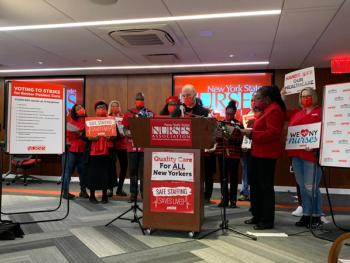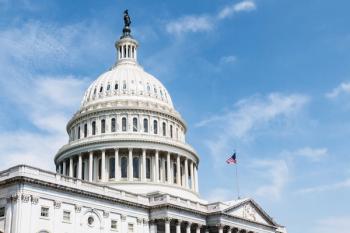
Technology is an essential tool to recruit and retain valuable workers.

Technology is an essential tool to recruit and retain valuable workers.

About 100,000 nurses in Great Britain went on strike twice in a week. In New York, about 14,000 nurses have authorized a strike.

Cooper, based in Camden, N.J., is the much larger system, and Cape Regional said the market is becoming tougher for smaller systems. Analysts expect more smaller systems will be seeking partners.

In an interview with Chief Healthcare Executive, Lee Kim of HIMSS outlined the current threats, how health systems are responding, and where they need to improve.

The American Medical Association and groups from every state said the cuts will add to the financial hardships clinicians are facing.

It has been a record year for healthcare claim denials and underpayments, often leaving providers to foot the bill. Here are 10 suggestions to help providers avoid preventable denials.

Health systems announced the agreements, which still need ratification from union membership. About 15,000 nurses were poised to go on strike beginning Sunday.

Nurses are planning to walkout beginning Dec. 11, and most plan to be on strike for about three weeks. Hospitals, packed with patients with RSV and other illnesses, say the strike comes at a particularly difficult time.

Nearly one in 10 hospitals are in danger of closing their doors, the Texas Hospital Association says. Rural hospitals are at the greatest risk, but some urban hospitals could be forced to cut services.

Health systems continue to struggle with higher expenses, including rising labor costs, according to the latest monthly report from Kaufman Hall.

Accreditation and certification programs can help organizations address gaps and demonstrate to other providers, partners, and insurers that they are serious about protecting healthcare data.

The two systems are creating a new organization with 11 hospitals serving patients in Wisconsin, Michigan, Minnesota and Iowa.

The end of the third quarter continued what has been one of the worst years for hospitals, according to Kaufman Hall’s new monthly report.

Physicians and advocates are bracing for reduced reimbursements and another cut due to the sequester, unless lawmakers intervene.

Most say it’s affecting their ability to offer better compensation, according to a new survey. Employers are angry about the price of drugs and hospital costs.

A small number of organizations accounted for the bulk of the spending, according to a new study. Researchers say they may have an outsized role in developing health policy.

The final two months before the next congressional session is known as the ‘lame duck’ period, but health systems want lawmakers to deliver on some key priorities.

The Federal Trade Commission said the deal would lead to higher healthcare costs and lower quality. Federal regulators have applied more scrutiny to hospital deals.

The process of replacing an age-old practice - hand-filled paper notebooks - remains not just a technical challenge but also a social one.

Health systems are struggling with labor shortages and higher costs. Leaders say they are boosting pay and offering incentives to recruit and retain workers, a Kaufman Hall report finds.

At a health conference, executives unveiled new solutions and sent a message that healthcare is the company’s focus.

The gender pay gap is seen among primary care physicians and specialists. Many women physicians say they aren’t being compensated fairly.

The number of transactions this year is on the lower side, but they are bigger deals. And three health system deals were announced within a week.

If they agree to come together, a merger would produce a system with 25 hospitals and more than 26,000 employees. The deal comes during a fairly slow period for hospital consolidations.

About 9 out of 10 groups say they are facing greater demands, according to a survey by the Medical Group Management Association. Prior authorization tops the list.